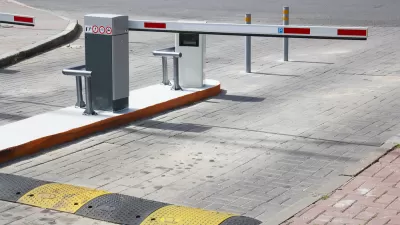Big news on the automated vehicle front yesterday, as Google and Uber now seem destined to become competitors in the battle for the future of transportation.
"Google is preparing to offer its own ride-hailing service, most likely in conjunction with its long-in-development driverless car project," reports Brad Stone. The news comes as a surprise given Google Ventures' $258 million investment in Uber back in August 2013. If the report is true, Google and Uber could potentially become fierce competitors in the future transportation market.
According to Stone, David Drummond, Google’s chief legal officer and senior vice president of corporate development, has informed the Uber board of Google's plans. According to Stone's reportage, "Uber executives have seen screenshots of what appears to be a Google ride-sharing app that is currently being used by Google employees."
In related news, John Biggs reported that Uber is partnering with Carnegie Mellon on a robotics research lab in Pittsburgh. Uber published a blog post later in the day confirming Biggs's scoop. According to the post, "[the] partnership will provide a forum for Uber technology leaders to work closely with CMU faculty, staff, and students — both on campus and at the National Robotics Engineering Center (NREC) — to do research and development, primarily in the areas of mapping and vehicle safety and autonomy technology."
For additional commentary on the developing story, Timothy B. Lee adds his take on why Google is making a push into self-driving rental car technology.
FULL STORY: Exclusive: Google Is Developing Its Own Uber Competitor

Planetizen Federal Action Tracker
A weekly monitor of how Trump’s orders and actions are impacting planners and planning in America.

Maui's Vacation Rental Debate Turns Ugly
Verbal attacks, misinformation campaigns and fistfights plague a high-stakes debate to convert thousands of vacation rentals into long-term housing.

San Francisco Suspends Traffic Calming Amidst Record Deaths
Citing “a challenging fiscal landscape,” the city will cease the program on the heels of 42 traffic deaths, including 24 pedestrians.

Amtrak Rolls Out New Orleans to Alabama “Mardi Gras” Train
The new service will operate morning and evening departures between Mobile and New Orleans.

The Subversive Car-Free Guide to Trump's Great American Road Trip
Car-free ways to access Chicagoland’s best tourist attractions.

San Antonio and Austin are Fusing Into one Massive Megaregion
The region spanning the two central Texas cities is growing fast, posing challenges for local infrastructure and water supplies.
Urban Design for Planners 1: Software Tools
This six-course series explores essential urban design concepts using open source software and equips planners with the tools they need to participate fully in the urban design process.
Planning for Universal Design
Learn the tools for implementing Universal Design in planning regulations.
Heyer Gruel & Associates PA
JM Goldson LLC
Custer County Colorado
City of Camden Redevelopment Agency
City of Astoria
Transportation Research & Education Center (TREC) at Portland State University
Jefferson Parish Government
Camden Redevelopment Agency
City of Claremont




























